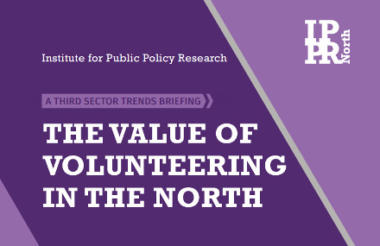Successive governments have invested in programmes designed to increase the level of volunteering on the “misplaced” assumption that there is a “large ‘untapped resource’ of volunteers”, according to research published yesterday.
IPPR North published research on volunteering, called The Value of Volunteering in the North, which said that overall levels of volunteering have remained stable despite interventions, and that government and charities should focus on the quality of volunteering rather than the number of volunteers.
“Successive governments have invested significant funds in aspects of volunteering based on an assumption that a large ‘untapped resource’ of volunteers exists,” the report says.
It highlights the Civil Society Strategy’s commitment to growing volunteering and removing obstacles as the most recent example, but says: “This intention, while laudable, might be slightly misplaced.”
It adds: “There is little evidence that successive interventions have made any difference to the headline rates of volunteering.”
But it also says that quality of volunteers is more important than the total number.
“Our analysis suggests that, more than aggregate numbers of volunteers, what is most important to most third sector organisations is the quality and depth of support they receive, rather than additional numbers of volunteers,” it says.
The report says that for smaller charities having a few committed, regular volunteers who can work independently is most valuable and that “such organisations are more likely to value financial and in-kind support to keep going, including pro-bono advice, reduced rates for room hire, help with fundraising, back office support,” than more volunteers.
The report acknowledges that programmes such National Citizen Service can be helpful to larger charities as can corporate social responsibility programmes but that: “Much of this work, however, produces ‘ephemeral’ volunteering experiences.”
Three-quarters of small charities depend on volunteers
IPPR North says that the its report highlights the importance of volunteers, with three out of four of the smallest charities relying on them.
Its conclusions draw on a survey of 3,500 charities in the north of England and the research was carried out in partnership with academics from Durham University.
Report co-author, Jack Hunter, research fellow at IPPR North, said: “We might sometimes think of volunteers as well-meaning but ultimately ineffective. Today’s report demonstrates without a doubt that this is not the case.
“Our analysis also shows that experienced and committed volunteers form the backbone of a huge proportion of the third sector in the North of England.
“Many of the smallest organisations are often completely reliant on the contribution of unpaid volunteers who give their time willingly and on a regular basis. Without them, a vast swathe of civil society organisations would simply cease to exist, with huge consequences for places up and down the North, and for the state of the Northern Powerhouse economy.”
|
Related articles











